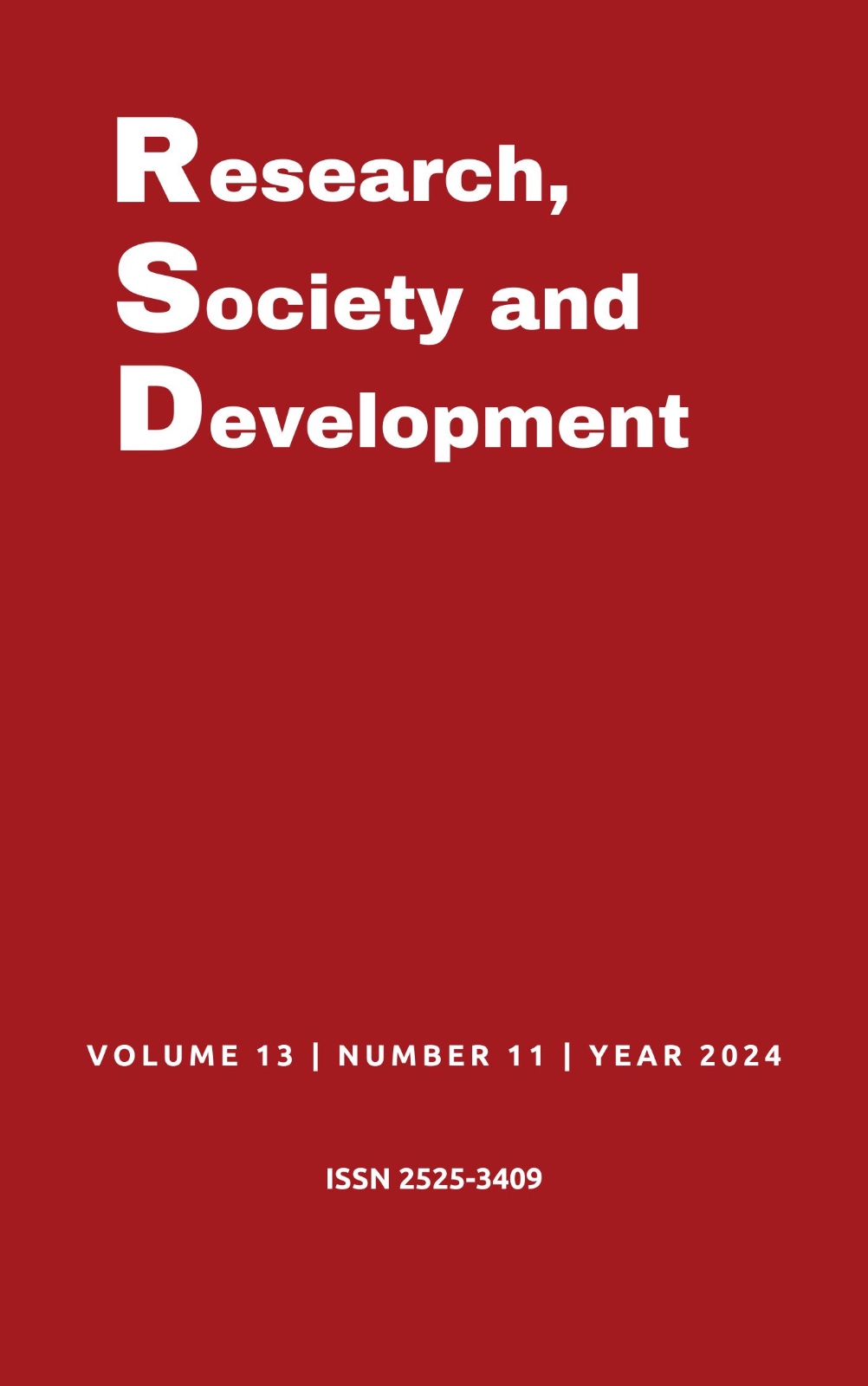Análise de teor de cafeína em refrigerantes e sua correlação com impacto na saúde de indivíduos hipertensos
DOI:
https://doi.org/10.33448/rsd-v13i11.47488Palavras-chave:
Hipertensão arterial sistêmica, Estimulante do sistema nervoso central, Cafeína.Resumo
Este estudo analise o teor e investiga a relação entre o consumo de refrigerante cafeinado e a hipertensão arterial sistêmica (HAS), uma condição crônica que aumenta o risco de doenças cardiovasculares. A cafeína, um alcaloide presente em diversas bebidas, tem sido amplamente estudada por seus efeitos sobre a pressão arterial. O objetivo do presente artigo é apresentar o resultado de uma pesquisa que foca na análise de refrigerantes com cafeína, consumidos por uma ampla faixa da população, incluindo indivíduos hipertensos. Em relação à metodologia, foi realizada uma pesquisa laboratorial de natureza quantitivativa a qual envolve a remoção de cafeína de amostras de refrigerante, seguida pela análise com detector UV-Vis. Embora os resultados estejam dentro dos limites permitidos pela ANVISA para o teor de cafeína, o consumo total proveniente de diversas fontes, como café e bebidas energéticas, pode afetar a pressão arterial. Estudos revisados apontam que a cafeína pode causar aumentos temporários na pressão arterial, com efeitos mais acentuados em indivíduos hipertensos. É importante que pacientes hipertensos sejam cautelosos e moderem o consumo de cafeína. Porém devido à escassez mais estudos são necessários para avaliar os efeitos a longo prazo da cafeína em pacientes com Hipertensão Arterial e torna-se necessária a orientação médica individualizada.
Referências
ANVISA. (2010). Resolução RDC nº 18, de 26 de janeiro de 2010: Regulamento técnico sobre bebidas energéticas. https://www.gov.br/anvisa/pt-br
Birkett, D. J., & Logan, A. G. (1988). Efeitos da cafeína sobre a pressão arterial. Revista de Hipertensão, 6(4), S620-S622. doi: 10.1097/00004872-198812040-00194
Bloom, C. A., et al. (2024). Spontaneous coronary artery dissection in a 19-year-old male athlete. JACC: Case Reports, 29(3), 102189. https://doi.org/10.1016/j.jaccas.2023.102189
Cornelis, M. C., El-Sohemy, A., Kabagambe, E. K., & Campos, H. (2006). Café, genótipo CYP1A2 e risco de infarto do miocárdio. JAMA, 295(10), 1135-1141
Fung, T. T. (2009). Café e risco cardiovascular. Revista Internacional de Pesquisa Cardiovascular, 32(3), 23.
Giuseppe, F., & colaboradores. (2019a). O efeito da cafeína sobre a pressão arterial: Uma revisão dos resultados clínicos. Revista de Hipertensão Clínica, 21(4).
Giuseppe, R., Napoli, L., Granata, F., Mottolese, A., & Cena, H. (2019b). Caffeine and blood pressure: a critical review perspective. Nutrition Research Reviews, 32(2), 169-175. doi: 10.1017/S0954422419000015
James, P. A., Oparil, S., Carter, B. L., Cushman, W. C., Dennison-Himmelfarb, C., Handler, J., … Ortiz, E. (2014). 2014 Evidence-Based Guideline for the Management of High Blood Pressure in Adults. JAMA, 311(5), 507.
La Vieille, S., et al. (2021). Caffeinated energy drinks in the Canadian context: Health risk assessment with a focus on cardiovascular effects. Applied Physiology, Nutrition, and Metabolism, 46(9), 1019–1028. https://pubmed.ncbi.nlm.nih.gov/34000209.
Lopez-Garcia, E., van Dam, R M, Li, T Y, & Hu, F B. (2016). Consumo de café e risco de hipertensão em uma grande coorte de indivíduos hipertensos. American Journal of Hypertension, 29(3), 267-275.
Lovallo, W. R., et al. (2004). Cardiovascular effects of caffeine in men and women. American Journal of Cardiology, 93, 1022-1026.
Organização Pan-Americana de Saúde. (2022). Hipertensão arterial sistêmica. Recuperado de https://www.pa.org
Pereira, A. S., et al. (2018). Metodologia da pesquisa científica (free e-book). Santa Maria/RS: Ed. UAB/NTE/UFSM.
Pellizzaro, M. C., & Pancheniak, E. F. E. (2003). Assistência farmacêutica no tratamento de doenças cardiovasculares e hipertensão. Infarma, 15(9-10), 69-71.
Rashid, A., Hines, M., Scherlag, B. J., Yamanashi, W. S., & Lovallo, W. (2006). The effects of caffeine on the inducibility of atrial fibrillation. Journal of Electrocardiology, 39(4), 421-425.
Senftinger, D., Oliveira, M S, & Silva, JP. (2023). Efeitos do consumo de café sobre a saúde cardiovascular: Uma revisão atualizada. Revista de Nutrição Clínica, 72, 124-131.
Srivastava, N., & Sarkar, D. (2023). Effect of caffeine on systolic blood pressure and heart rate in healthy young adults. Indian Journal of Applied Research, 13(10), 35. https://doi.org/10.36106/ijar/8601362
Skoog, D. A., West, D. M., Holler, F J, & Crouch, S R. (2009). Fundamentos de Química Analítica (9ª ed.). Ed. Thomson.
Tavares, M. R., Sakata, R. M., & Rioko, A. M. (2012). Cafeína: Aspectos químicos e fisiológicos. Revista de Ciências Farmacêuticas, 28(4), 1132-1138.
Toassi, R. F. C., & Petry, P. C. (2021). Metodologia científica aplicada à área da Saúde (2ª ed.). Editora da UFRGS.
Downloads
Publicado
Edição
Seção
Licença
Copyright (c) 2024 Lucas Guilherme Esprisson; Thatiana Maite Otto

Este trabalho está licenciado sob uma licença Creative Commons Attribution 4.0 International License.
Autores que publicam nesta revista concordam com os seguintes termos:
1) Autores mantém os direitos autorais e concedem à revista o direito de primeira publicação, com o trabalho simultaneamente licenciado sob a Licença Creative Commons Attribution que permite o compartilhamento do trabalho com reconhecimento da autoria e publicação inicial nesta revista.
2) Autores têm autorização para assumir contratos adicionais separadamente, para distribuição não-exclusiva da versão do trabalho publicada nesta revista (ex.: publicar em repositório institucional ou como capítulo de livro), com reconhecimento de autoria e publicação inicial nesta revista.
3) Autores têm permissão e são estimulados a publicar e distribuir seu trabalho online (ex.: em repositórios institucionais ou na sua página pessoal) a qualquer ponto antes ou durante o processo editorial, já que isso pode gerar alterações produtivas, bem como aumentar o impacto e a citação do trabalho publicado.


